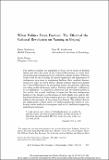| dc.contributor.author | Obukhova, Elena | |
| dc.contributor.author | Zhang, Jiayin | |
| dc.contributor.author | Zuckerman Sivan, Ezra W | |
| dc.date.accessioned | 2017-05-30T19:21:54Z | |
| dc.date.available | 2017-05-30T19:21:54Z | |
| dc.date.issued | 2014-09 | |
| dc.identifier.issn | 0002-9602 | |
| dc.identifier.issn | 1537-5390 | |
| dc.identifier.uri | http://hdl.handle.net/1721.1/109434 | |
| dc.description.abstract | The authors examine the popularity of boys’ given names in Beijing before and after the onset of the Cultural Revolution to clarify how exogenous and endogenous factors interact to shape fashion. Whereas recent work in the sociology of culture emphasizes the importance of endogenous processes in explaining fashion, their analysis demonstrates two ways in which politics shaped cultural expression during the Cultural Revolution: by promoting forms of expression reflecting prevailing political ideology and by limiting individuals’ willingness to act differently. As argued by Lieberson and developed further in this article, the second condition is important because endogenous fashion cycles require a critical mass of individuals who seek to differentiate themselves from common practice. Exogenous factors can influence the operation of the endogenous factors. The authors discuss the implications of their study for understanding the nature of conformity under authoritarian regimes and social conditions supporting individual expression. | en_US |
| dc.language.iso | en_US | |
| dc.publisher | University of Chicago Press | en_US |
| dc.relation.isversionof | http://dx.doi.org/10.1086/678318 | en_US |
| dc.rights | Article is made available in accordance with the publisher's policy and may be subject to US copyright law. Please refer to the publisher's site for terms of use. | en_US |
| dc.source | University of Chicago Press | en_US |
| dc.title | When Politics Froze Fashion: The Effect of the Cultural Revolution on Naming in Beijing | en_US |
| dc.type | Article | en_US |
| dc.identifier.citation | Obukhova, Elena; Zuckerman, Ezra W. and Zhang, Jiayin. “When Politics Froze Fashion: The Effect of the Cultural Revolution on Naming in Beijing.” American Journal of Sociology 120, no. 2 (September 2014): 555–583 © 2015 University of Chicago. | en_US |
| dc.contributor.department | Sloan School of Management | en_US |
| dc.contributor.mitauthor | Zuckerman Sivan, Ezra W | |
| dc.relation.journal | American Journal of Sociology | en_US |
| dc.eprint.version | Final published version | en_US |
| dc.type.uri | http://purl.org/eprint/type/JournalArticle | en_US |
| eprint.status | http://purl.org/eprint/status/PeerReviewed | en_US |
| dspace.orderedauthors | Obukhova, Elena; Zuckerman, Ezra W.; Zhang, Jiayin | en_US |
| dspace.embargo.terms | N | en_US |
| dc.identifier.orcid | https://orcid.org/0000-0002-6271-0708 | |
| mit.license | PUBLISHER_POLICY | en_US |
